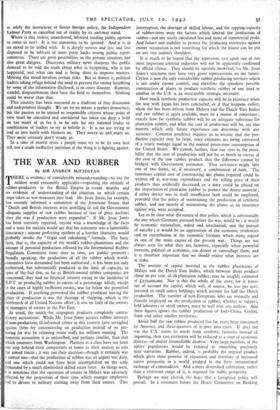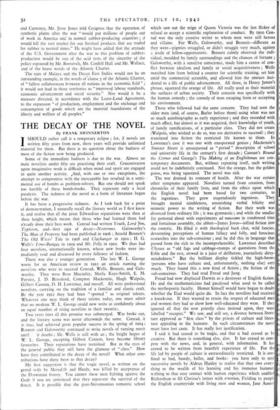THE WAR AND RUBBER
By SIR ANDREW McFADYEAN
THERE is evidence of considerable misunderstanding—to use the mildest word reasonably applicable—regarding the attitude of rubber-producers in the British Empire in recent months and no evidence of understanding of the situation to which certain steps taken as war-measures may lead. Mr. Jesse Jones, for example, has recently informed a committee of the American Senate that " Dutch and British interests were unwilling to sell the Government adequate supplies of raw rubber because of fear of price declines after the war if production were expanded." If Mr. Jesse Jones has been correctly reported, anyone with a knowledge of the facts and a taste for meiosis would say that his statement was a lamentable inaccuracy ; anyone preferring epithets of a harsher character would probably invoke the " frigid and calculating " formula. The basic facts, that is, the capacity of the world's rubber-plantations and the amount of potential production released by the International Rubber Regulation Committee from time to time, are public property ; broadly speaking, the production of all the rubber which world- consumers have demanded has been authorised ; it has been not only authorised, but substantially produced to the limit of capacity, in spite of the fact that, so far as British-owned rubber companies are concerned, they had no financial interest owing to the incidence of E.P.T. in producing rubber in excess of a percentage which, except in the cases of highly inefficient estates, was far below the permitted production. If anything prevented the rubber produced leaving the place of production it was the shortage of shipping, which is the bottleneck of all United Nations effort ; it was no fault of the owners or managers of estates in the Far East.
As usual, the search for scapegoats produces completely contra- dictory accusations. While Mr. Jesse Jones accuses rubber interests of non-production, ill-informed critics in this country have inveighed against them for concentrating on production instead of on pre- paring for war by releasing estate staffs for military training. The domestic accusation is as unjustified, and perhaps crueller, than that which emanates from Washington. Planters as a class have not been one step behind their compatriots at home in their anxiety to join the armed forces ; it was not their decision—though it certainly was a correct one—that the production of rubber was an urgent war duty, and one which could not have been accomplished on the scale demanded by a much diminished skilled estate force. As things were, it is notorious that the operation of estates in Malaya was adversely affected by the proportion of their time which younger employees had to devote to military training away from their estates. This interruption, the shortage of skilled labour, and the tapping-capacity of rubber-trees were the factors which limited the production of tubber—not any nicely calculated less and more of commercial profit. And failure and inability to protect the producing territories against enemy occupation is not something for which the blame can be put on any one nation's shoulders.
It is much to be hoped that the aspersions cast upon one of our most important colonial industries will not be apparently confirmed by official silence. They should be squarely answered, for Mr. Jesse Jones's strictures may have very grave repercussions on the future. Ceylon is now the only considerable rubber-producing territory which is not under enemy control, and therefore the speediest possible construction of plants to produce synthetic rubber of one kind or another in the U.S. is an inescapable strategic necessity.
How much synthetic productive capacity will be in existence when the war with Japan has been concluded, or if that happens earlier, when she has been driven from Malaya and the Dutch East Indies and raw rubber is again available, must be a matter of conjecture ; exactly how far synthetic rubber will be an adequate substitute for plantation rubber, and what the cost of production will be, are also matters which only future experience can determine with any accuracy. Common prudence requires us to assume that the pro- ductive capacity may be large, since estimates are being canvassed of a yearly tonnage equal to the normal peace-time consumption of the United States. We cannot, further, shut our eyes to the possi- bility that the cost of production will not be so much in excess of the cost of the raw rubber product that the difference cannot be bridged with Government assistance. That assistance might take one of two forms, or, if necessary, a combination of both. The enormous capital cost of constructing the plants required could be written off as war-time expenditure and the selling price of their products thus artificially decreased, or a duty could be placed on the importation of plantation rubber to protect the dearer material ; if either device was in itself insufficient both could be employed, provided that the policy of maintaining the production of synthetic rubber, and not merely of maintaining the plants as an insurance against war, were accepted.
Let us be clear what the nature of that policy, which is substantially the one which Germany pursued before the war, would be ; it would be economic nationalism, naked and unashamed, and the pursuit of autarky ; it would be an aggravation of the economic tendencies and an exacerbation of the economic frictions which many regard as one of the main causes of the present war. Things are not always seen for what they are, however, especially when powerful interests, political or economic, can distort or camouflage them, and it is therefore important that we should realise what interests are at stake.
The amount of capital invested in the rubber plantations of Malaya and the Dutch East Indies, which between them produce about 90 per cent, of all plantation rubber, may be roughly estimated at £250,000,000. Nor is this the whole of the story, for it leaves out of account the capital, which will, of course, be less per acre, invested in small native holdings, which account for half the Dutch production. The number of non-Europeans who are normally and directly employed on the production of rubber, whether as tappers, field labourers or small owners, must be well over one million. And these figures ignore the rubber production of Indo-China, Ceylon, Siam and other smaller territories.
About half the raw rubber produced has for years been consumed by America, and three-quarters of it goes into tyres. If after the war the U.S. meets its needs from synthetic factories instead of importing, then vast territories will be reduced to a state of economic distress—of almost irremediable distress. Very large numbers of the native populations would be reduced to something perilously near starvation. Rubber, indeed, is probably the tropical product which gives most promise of expansion and therefore of increased native prosperity in a world pledged to the freer international exchange of commodities. And a more diversified cultivation, rather than a restricted range of it, is required for stable prosperity.
Perhaps we may cherish the hope that a farsighted policy will prevail. In a statement before the House Committee on Banking and Currency, Mr. Jesse Jones told Congress that the operation of synthetic plants after the war " would put millions of people out of work in America and in normal rubber-producing countries ; it would kill the vast market for our finished products that are traded for rubber in normal times." He might have added that the attitude of the U.S. Government after the war to this problem of rubber- production would be one of the acid tests of the sincerity of the policy espoused by Mr. Roosevelt, Mr. Cordell Hull and Mr. Wallace, and of the brave words of the Atlantic Charter.
The ruin of Malaya and the Dutch East Indies would not be an outstanding example, in the words of clause 5 of the Atlantic Charter, of " fullest collaboration bttween all nations in the economic field " ; it would not lead in those territories to " improved labour standards, economic advancement and social security." Nor would it be a measure directed, in accordance with the Lease-Lend Agreement, to the expansion " of production, employment and the exchange and consumption of goods which are the material foundations of the liberty and welfare of all peoples."



























 Previous page
Previous page